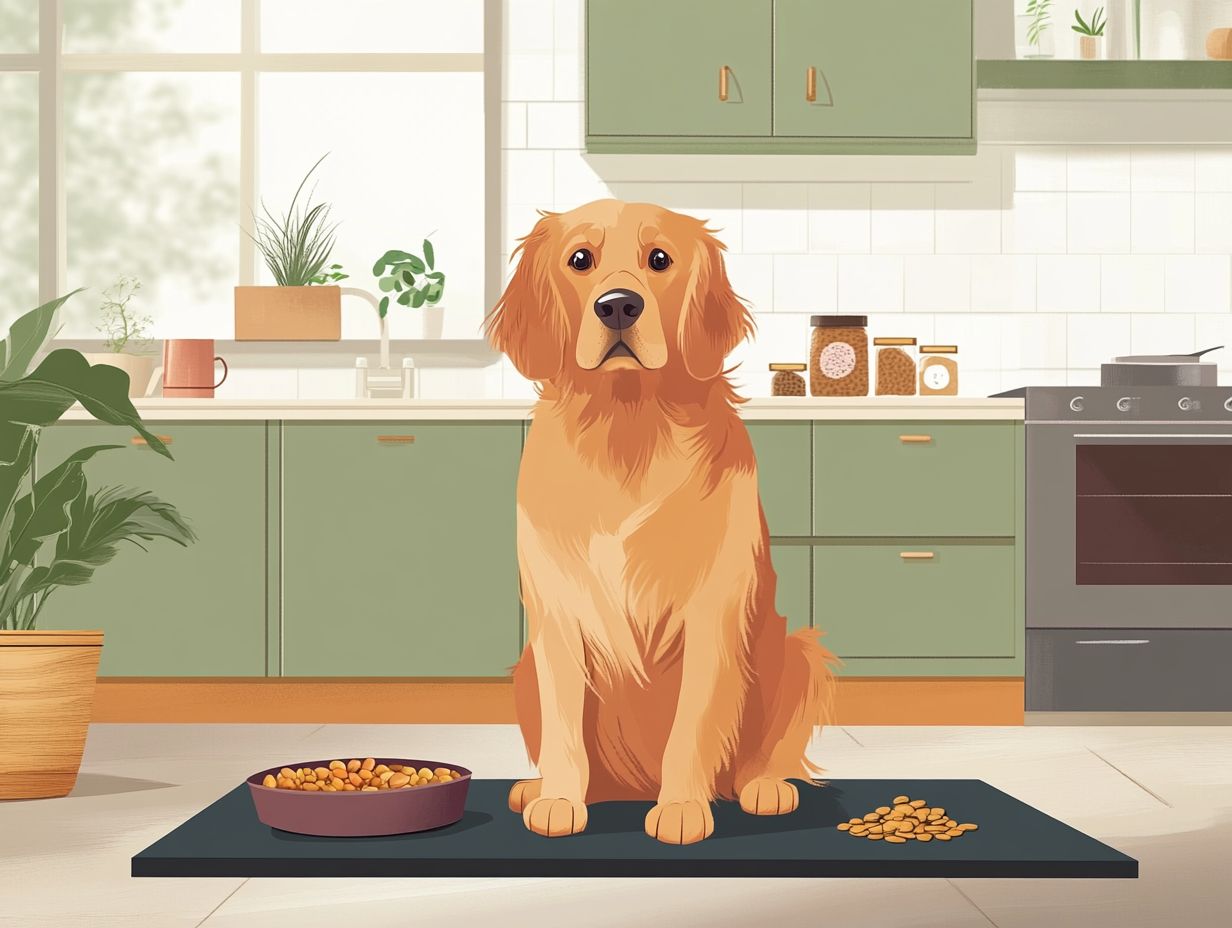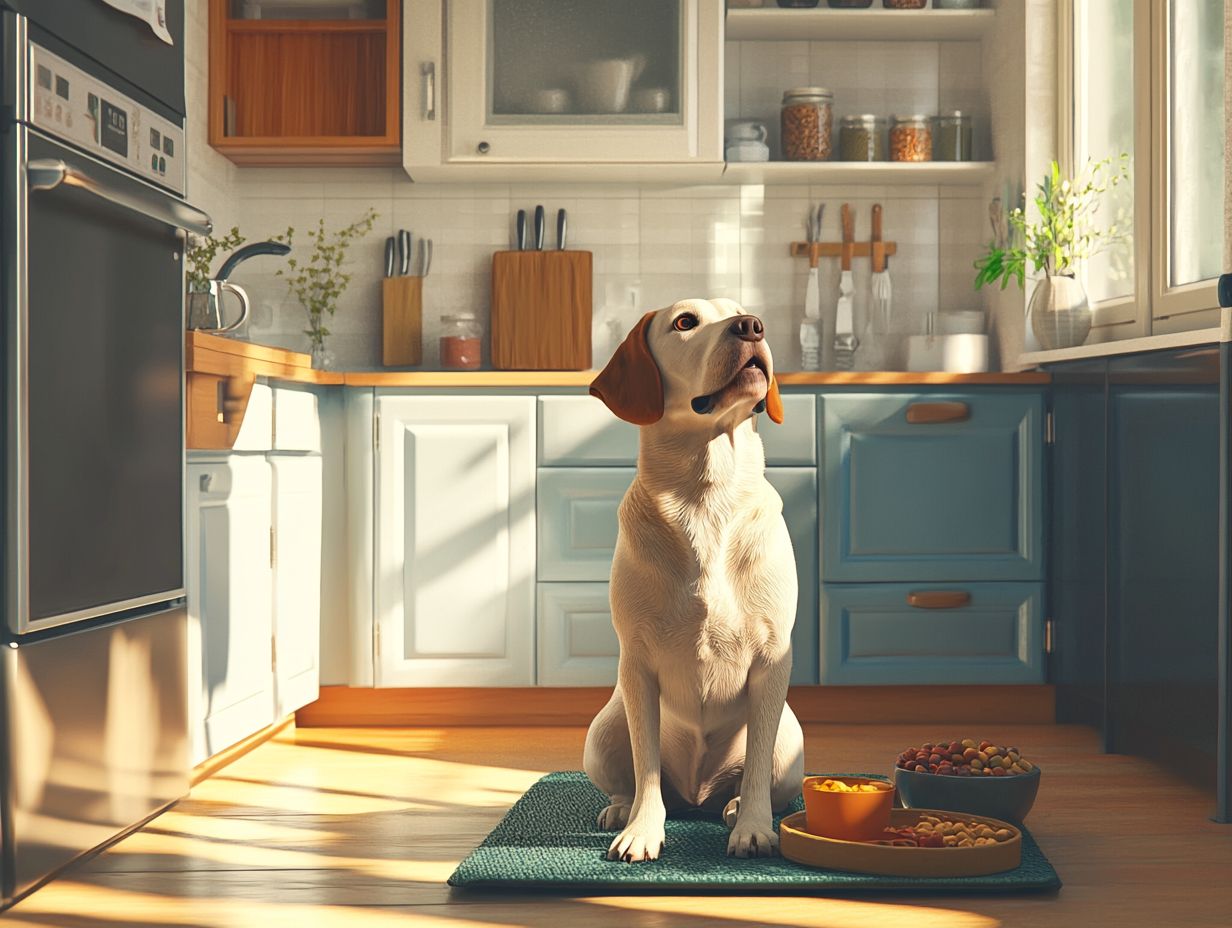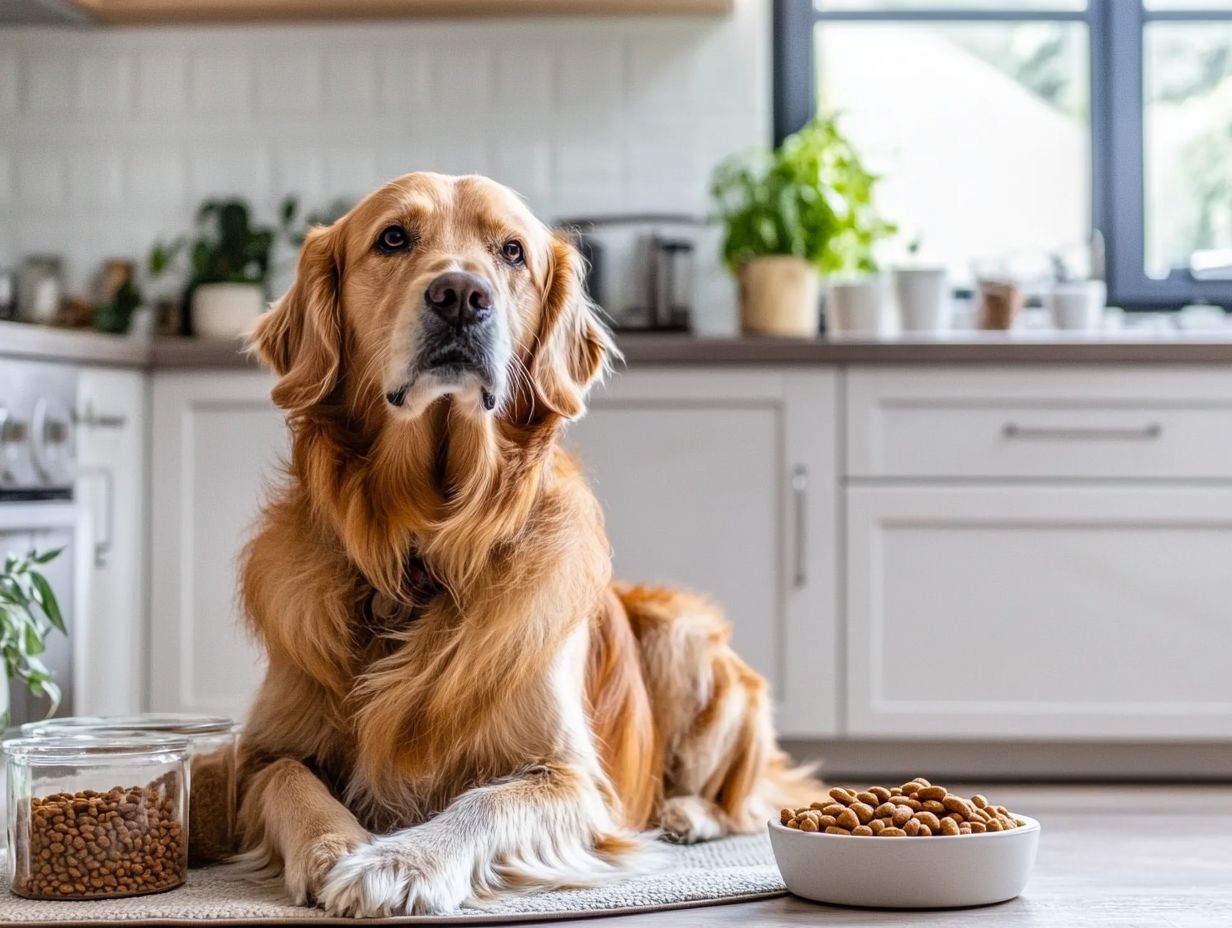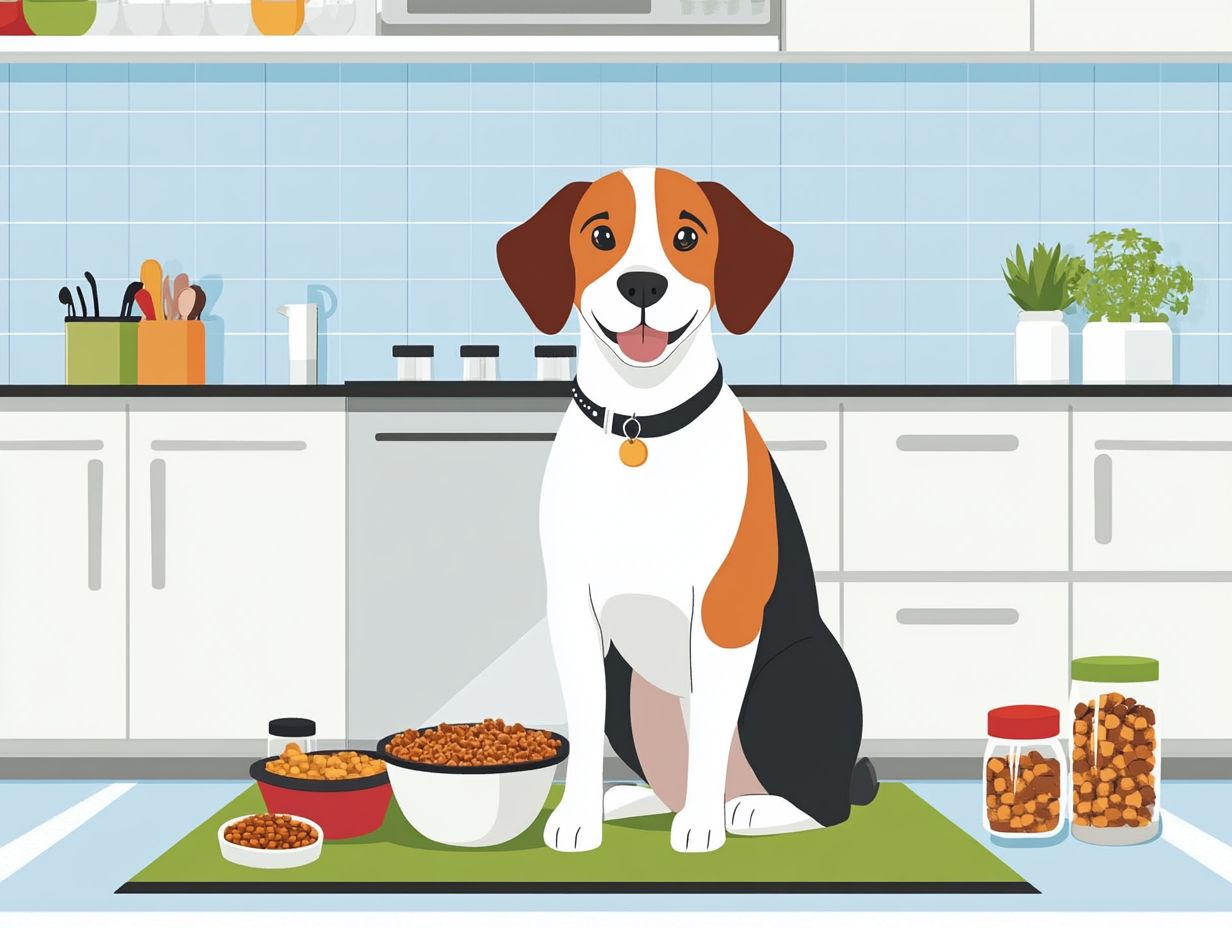Are There Specific Foods That Calm Anxious Pets?
Pet anxiety is becoming an increasingly pressing issue for many pet owners, directly affecting the well-being of your pets.
Understanding the causes and symptoms of anxiety in dogs is essential for effective management. This discussion delves into how diet can alleviate this issue, spotlighting specific calming foods that can help soothe your anxious dog and highlighting those that should be avoided.
It also explores alternative treatments, including natural remedies to improve digestion and behavioral therapy. You’ll find practical tips for crafting a balanced diet tailored to your anxious pet s particular needs.
Explore how you can positively influence your pet’s mental health and create a calmer, happier environment for them.
Contents
- Key Takeaways:
- Understanding Pet Anxiety
- The Role of Diet in Managing Pet Anxiety
- Alternative Treatments for Pet Anxiety
- Creating a Balanced Diet for Anxious Pets
- Frequently Asked Questions
- Are There Specific Foods That Calm Anxious Pets?
- What are some examples of foods that can calm anxious pets?
- Why do these foods help to calm anxious pets?
- Can I give these foods to my pet daily?
- Are there any foods that I should avoid giving my anxious pet?
- Is it enough to just feed my pet these calming foods to help with their anxiety?
Key Takeaways:

- Incorporating calming foods into your pet’s daily meals can help manage their anxiety.
- Avoid feeding your anxious pet foods that are high in sugar, caffeine, or artificial ingredients.
- Talk to your vet about a balanced diet and explore options like supplements and behavioral therapy.
Understanding Pet Anxiety
Understanding dog anxiety is essential for you as a dog owner, as it directly impacts the well-being of your furry friend. Anxious dogs often show behaviors like barking, hiding, or even destructive tendencies that signal their distress.
Recognizing these signs is your first step in addressing their needs. Various factors such as changes in their environment, lack of socialization, or underlying health issues can contribute to their anxiety.
This insight opens the door to effective management techniques. These may include both behavioral strategies and dietary adjustments, like incorporating calming foods rich in antioxidants for dogs and healthy fats.
By adopting holistic care practices, you can significantly reduce your dog’s anxiety and enhance their overall quality of life.
Causes and Symptoms
The causes and symptoms of an anxious dog can vary significantly. They can be influenced by everything from environmental factors to underlying health concerns.
You might notice common triggers for dog anxiety, such as loud noises, changes in routine, or separation from you. These can lead to destructive behaviors or excessive barking.
Symptoms like trembling, panting, and hiding are key indicators that your dog is feeling stressed and uncomfortable. Recognizing these signs is crucial for effectively reducing stress.
Certain breeds may be more prone to anxiety. It’s essential for you to be attuned to your dog s specific needs.
Factors such as past trauma, inadequate socialization, or even health issues can heighten anxiety levels. This creates a cycle of fear and stress.
Alongside physical symptoms, you may observe behaviors like pacing, excessive licking, or even aggression when your dog feels overwhelmed.
Creating a safe space and maintaining a consistent routine can help reduce anxiety. Techniques like anxiety wraps or aromatherapy are also beneficial.
By understanding these causes and symptoms, you can take action now to create a nurturing environment for your furry friend!
The Role of Diet in Managing Pet Anxiety
The role of diet in managing your pet’s anxiety is crucial. What your dog consumes significantly impacts their overall mental and physical health, but choosing the right items, such as toys for anxious pets, can also make a difference.
Calming foods can boost serotonin production, vital for mood regulation and emotional stability.
Incorporating ingredients rich in L-Tryptophan, like turkey and oats, helps improve mood. For more options, consider exploring the best calming products for pets, as these foods are beneficial for anxious dogs.
Incorporating healthy fats, such as omega-3 fatty acids for dogs, is essential for improving digestion and overall well-being.
By adopting a holistic approach to your dog s diet, you can effectively manage their anxiety through thoughtful dietary choices.
Start today by evaluating your dog’s diet and consult your vet for personalized advice!
Foods that Can Help Calm Anxious Pets

Several foods can work wonders for calming your anxious dog while providing essential nutrients for relaxation and well-being, as explored in the article on how diet impacts anxiety in pets.
Consider options like salmon and turkey; these are fantastic sources of tryptophan, a natural substance that helps enhance relaxation by boosting serotonin production. Pumpkin and brown rice are also great options. They are gentle on digestive systems and rich in fiber, which supports gut health and helps maintain a stable mood.
Many pet owners use chamomile and valerian root for their calming effects. Blending these soothing foods and supplements into your dog’s meals, alongside understanding the role of nutrition in pet anxiety solutions, can truly transform their mood and create a nurturing environment that alleviates anxiety and boosts their overall happiness!
Foods to Avoid for Anxious Pets
Some foods should be off-limits in your dog’s diet, especially if they experience anxiety. These can worsen stress levels and harm overall health.
Unhealthy fats, processed foods, and ingredients like caffeine can lead to hyperactivity or digestive troubles, intensifying your dog’s anxiety.
Maintaining a balanced dog diet that excludes harmful substances is essential for promoting calmness and improving your dog’s quality of life. For example, chocolate and certain artificial sweeteners like xylitol can pose serious health risks.
High-sugar snacks may trigger energy spikes followed by crashes that amplify anxiety. Additionally, foods that are overly rich or spicy can upset your dog s stomach, adding discomfort.
Opting for wholesome, natural foods can stabilize your dog’s mood and foster a more tranquil environment, thereby enhancing their emotional well-being.
Alternative Treatments for Pet Anxiety
Alternative treatments for pet anxiety often include natural remedies for dogs, supplements, and behavioral therapy techniques that can effectively reduce stress without pharmaceuticals.
Many pet owners are drawn to calming chews and herbal supplements featuring ingredients like chamomile or valerian root, known for their soothing properties.
Implementing behavioral therapy techniques, such as training strategies from respected centers like Dan Gentle Dog Training Center in Howell Township, New Jersey, can be instrumental in addressing anxiety-related behaviors and creating a serene environment for your anxious dog.
Supplements and Herbs
Supplements and herbs can be valuable allies in managing your dog’s anxiety, offering calming properties that promote relaxation and emotional stability.
Take L-Tryptophan, for example. It’s known for supporting serotonin production essential for mood regulation. It s safe and can be easily mixed into your dog s food or provided as a tasty healthy snack for dogs.
Valerian root is another option, celebrated for its mild sedative effects. It s often recommended in tincture form or as capsules, with a typical dosage of about 1-2 mg per pound of body weight.
Chamomile tea is a delightful and soothing beverage for your dog, especially when brewed and cooled. These thoughtful additions can significantly alleviate anxiety and strengthen your dog’s emotional resilience against triggers like storms or separation.
By regularly incorporating these supplements, including raw goat s milk, you can better support your furry companion s mental health.
Behavioral Therapy

Behavioral therapy is an invaluable resource for managing your dog’s anxiety. It relies on methods that reward good behavior while alleviating stress.
Renowned facilities like the Dan Gentle Dog Training Center in Howell Township, New Jersey, offer specialized training programs designed to tackle anxiety-related issues.
By incorporating structured training sessions, such as dog training, and consistent reinforcement, you can create an environment that promotes stress reduction for dogs. This helps your anxious dog feel more secure in their surroundings.
This powerful approach not only changes behavior but also helps you connect with your dog’s emotional state. Techniques like gradually exposing your dog to stressors in a controlled way are often used to help your anxious dog acclimate to anxiety triggers.
Trainers employ a diverse range of methods, from basic obedience commands to interactive games, ensuring that each session is engaging and tailored to your dog’s unique needs. The expertise offered by facilities like the Dan Gentle Dog Training Center enables you to learn and implement these strategies effectively. This knowledge helps enhance your dog s emotional well-being long after formal training has wrapped up.
Creating a Balanced Diet for Anxious Pets
Crafting a balanced diet for your anxious pet requires a thoughtful approach. Selecting healthy snacks and incorporating calming foods can alleviate stress and enhance overall well-being. Additionally, you may want to explore how to encourage calm behavior in anxious pets for further support.
A nutritious diet for dogs should feature a diverse array of ingredients, including:
- Lean proteins
- Healthy fats, such as goats milk
- Fiber-rich vegetables
These ingredients play a vital role in promoting improved digestion and emotional health.
Seeking guidance from a veterinarian can offer you personalized insights into the best dietary choices for your specific furry companion. This ensures your pet gets the nutrients they need while effectively addressing their anxiety.
Incorporating Calming Foods into Daily Meals
Incorporating calming foods into your dog’s daily meals can significantly benefit their anxious nature. These foods provide essential nutrients, including L-tryptophan, which promotes relaxation and improves digestion. Additionally, you may wonder can CBD help calm anxious pets?
Ingredients like oily fish, kale, and sweet potatoes are excellent additions to your dog’s diet. They offer healthy fats and antioxidants that support overall health.
Gradually introduce these superfoods for dogs into their meals to create a calming and supportive dietary routine. Start by mixing small amounts of these new foods with their regular meals, allowing their digestive systems to adjust smoothly.
Fish, for instance, provides omega-3 fatty acids that soothe inflammation and support cognitive function. Kale is rich in vitamins A and C, enhancing your dog’s overall well-being, while sweet potatoes offer fiber and additional nutrients that promote digestive health. Adding pumpkin seeds and almonds can further enhance their nutritional intake.
Consistency and attentiveness are key when incorporating calming treats into their diet. By ensuring your furry friend adapts well to these changes, you’ll pave the way for a happier, more relaxed pup.
Take the first step today! Consult your veterinarian for personalized dietary recommendations and try incorporating these calming foods into your dog’s meals. If you’re concerned about your pet’s anxiety, you may wonder can anxiety be treated in pets?
Consulting with a Veterinarian
Consulting with a veterinarian is an essential step in managing your anxious dog’s diet and overall well-being. A professional can provide personalized recommendations tailored to your dog’s unique needs. This includes guidance on cooling foods for dogs, as well as insights into whether music can help soothe anxious pets to ensure that their dietary choices harmonize with their health status and anxiety levels.
Regular visits to the vet can help uncover underlying issues that might contribute to anxiety. This enables a comprehensive treatment approach that blends diet and behavioral therapy.
Veterinary professionals possess a deep understanding of dogs’ nutritional requirements. They can assess how specific foods, like turkey and blueberries, influence your dog’s emotional state. By incorporating nutrients known to alleviate stress, such as healthy fats, you can optimize your dog’s diet for improved mental health.
Veterinarians help you create a structured plan that includes behavioral modification techniques and exercises. For example, techniques offered at the Dan Gentle Dog Training Center in Howell Township, New Jersey can greatly improve the happiness of your furry friend!
With their expertise, you can navigate the complexities of anxiety management more effectively, ensuring your furry companion thrives both mentally and physically.
Frequently Asked Questions

Here are some common questions about calming foods for anxious pets.
Are There Specific Foods That Calm Anxious Pets?
Yes, there are certain foods that can help to calm anxious pets.
What are some examples of foods that can calm anxious pets?
Foods such as turkey, sweet potatoes, and blueberries have been shown to have a calming effect on pets, and you can explore more options in the article on natural remedies for pet anxiety.
Why do these foods help to calm anxious pets?
These foods contain nutrients and compounds that promote relaxation and reduce stress in pets.
Can I give these foods to my pet daily?
It’s best to consult with your veterinarian before making any changes to your pet’s diet. In general, these foods can be given in moderation as part of a balanced diet.
Are there any foods that I should avoid giving my anxious pet?
Yes, foods high in caffeine or sugar can worsen anxiety in pets, so it’s best to avoid giving them to your pet.
Is it enough to just feed my pet these calming foods to help with their anxiety?
While these foods can be beneficial in managing anxiety, it’s important to also address any underlying issues and seek professional help if needed.
Start your journey to a calmer pet today by scheduling a visit to your vet!






